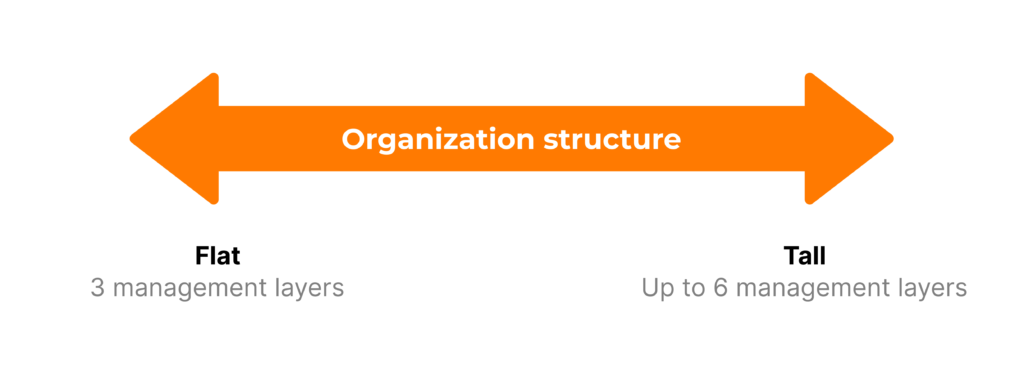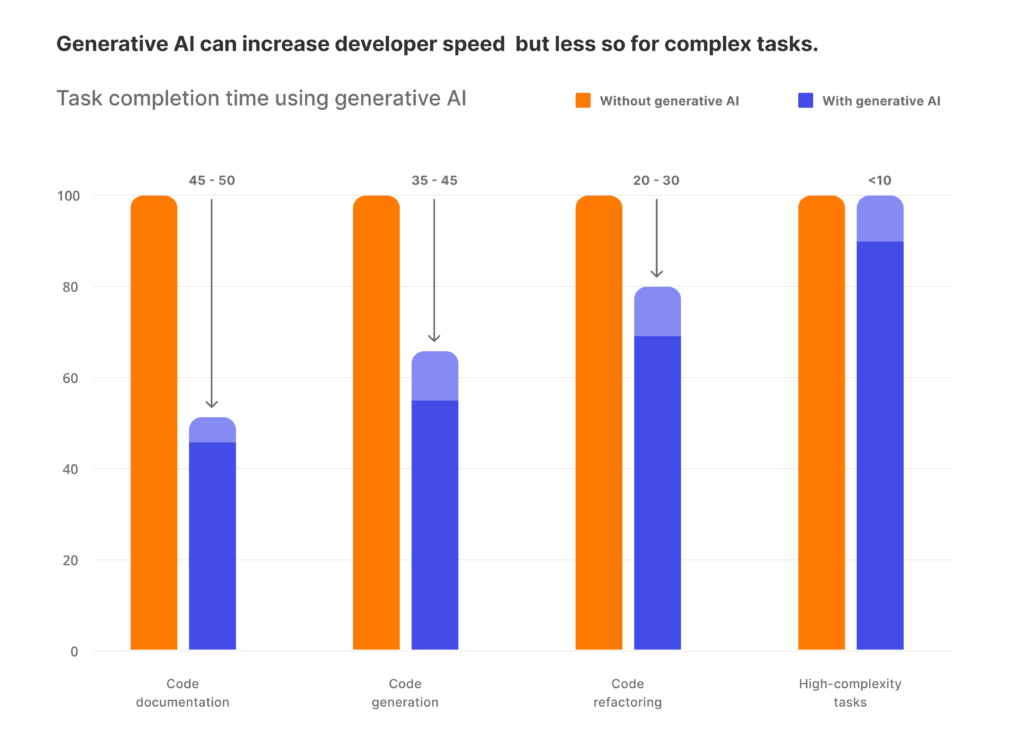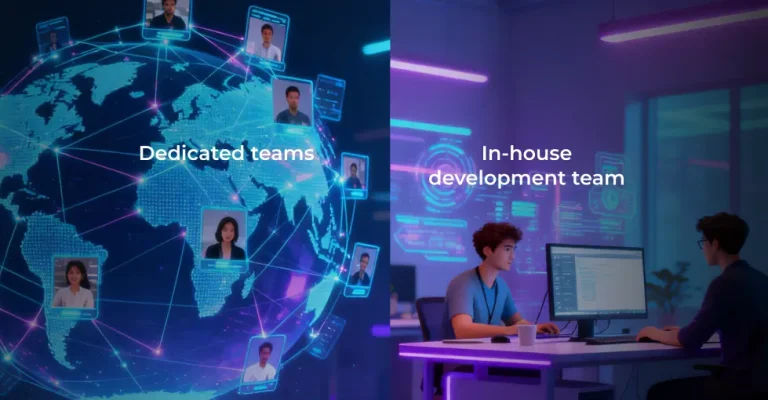The evolution of the engineering manager: leading teams in a changing industry
The software development industry is undergoing a significant transformation, marked by shifts in organizational structures, evolving expectations for leadership, and the emergence of powerful artificial intelligence tools. The changing landscape calls for re-evaluating the engineering manager role and their responsibilities in leading digital product teams.
Our team has been closely monitoring these changes and how they impact tech companies and engineering teams. In this article, we will dive deep into the recent evolution of the engineering manager role, the driving forces behind it, and implications for the near-term future.
The shifting landscape: more power to contributors
One of the most significant trends we’ve noticed is a move towards having more individual contributors (ICs) on teams compared to the number of managers. This isn’t just a hunch; big names like Meta and Amazon have publicly talked about this in the context of flattening their organizations.
For example, Meta announced their “Year of Efficiency” with plans to have more managers transition into individual contributor roles. Similarly, Amazon has set a goal to increase its IC-to-manager ratio. What’s fascinating is that we’ve seen this mirrored in our work with clients here at AgileEngine.

Take one of our clients, a 1,000-person scale-up focused on AI-powered customer communications. Their VP for Mobile Development wasn’t afraid to get their hands dirty, even contributing code in their first few weeks. Their Android engineering manager juggles managing the team with in-depth system knowledge and thorough peer code reviews. We also had our engineering manager on that account, who shifted from a coding-heavy team lead role to more management responsibilities and then back to focusing primarily on individual contributions.
What’s so special about this? Working side by side with engineers helped these managers build respect while maintaining a deep understanding of the product. This created a highly productive environment by smoothing collaboration between engineering and management.
Another AgileEngine client, a company in the roadside and mobility assistance space, made a bold move a couple of years ago. They flattened their engineering structure by entrusting some of the “pure” management responsibilities to technical leads. All the company’s engineers now ultimately report to the VP of Engineering for people management. Their reasons? They found that having technical folks in lead roles improves team outcomes. This move also led to cost savings by reducing overhead and streamlined communication by consolidating teams.
So, what’s driving this shift? Here are a few key factors we’ve observed:
- Empowering Individuals: Giving individual contributors more autonomy can foster a greater sense of ownership and accountability.
- Agility and Speed: Flatter organizations can often make decisions faster and be more responsive to change.
- Addressing Organizational Bloat: Some companies simply felt they had too many layers of management, slowing things down.
- Economic Realities: The need to be lean and efficient is a constant pressure in the tech world. Companies are constantly investigating how to optimize costs, and reducing management layers can lead to significant savings.
This trend has direct implications for Software Engineering Managers. The emphasis is shifting towards managers who can not only lead people but also provide strong technical guidance.
Leverage top-1% software talent from time-zone-friendly dev hubs to drive fast, impactful business results
The evolving expectations: technical leadership is key
The modern Software Engineering Manager is increasingly expected to be a technical leader. It’s not only about managing people and projects; these experts must also have a solid technical background and stay current with the latest technology trends. This technical depth allows managers to:
- Make informed decisions about technology choices.
- Communicate effectively with engineering teams.
- Accurately assess the feasibility of technical proposals.
- Build trust and respect within their teams.
For companies, the debate continues about how hands-on managers should be. Should they write code, participate in code reviews, or contribute to architectural discussions?
Some argue that staying hands-on helps managers maintain technical relevance and build rapport with engineers. Others caution that too much involvement can stifle team ownership and growth. We believe the sweet spot lies in finding a balance — providing technical leadership and guidance while empowering the team to take ownership of their work.
As controversial as it can sound, the Software Engineer Manager does not have to be the greatest rock star or the smartest person on the team. Engineering Managers should leave just enough hands-on work for themselves to empower the team and drive it in the right direction.
The strategies that companies can leverage to facilitate tech leadership in software engineering management include:
- Encourage engineers to pick up management skills and engage them in manager roles.
- Foster proactive technology-focused upskilling (e.g., product architecture, technical design, AI-augmented engineering, new programming languages and frameworks) among engineering managers.
- Create opportunities for engineering managers to tackle low-priority tasks, work on prototypes, and contribute to similar activities whenever they don’t block critical work.
In the meantime, engineering managers can follow these tips to stay technically sharp:
- Participate in design and code reviews to keep up with technical decisions and code quality.
- Engage in operational reviews and even join on-call rotations to experience the team’s challenges firsthand.
- Pair program with team members to share knowledge and stay connected to the code.
- Participate in hackathons to explore new technologies and understand the team’s capabilities.
- Contribute to technical documentation, publish technical blogs, and build internal tools to solidify their understanding of the product and provide value.
The key here is to create an environment where technical managers can remain technologically relevant without becoming a bottleneck. It’s about using their expertise to guide and support engineering teams, fostering their growth and sense of project ownership.
Generative AI: redefining collaboration
The emergence of generative AI tools, like GitHub Copilot, Claude, Cursor, or Windsurf, is another game-changer for software engineers. These tools can significantly boost coding speed and efficiency by:
- Providing intelligent code completions.
- Automating repetitive tasks.
- Generating boilerplate code.
- Assisting with debugging and testing.
Research has shown substantial productivity gains for developers using these AI assistants. According to McKinsey, generative AI tools help teams accelerate code production by 35–45%, refactoring by 20–30%, and documentation by 45–50%. AI-driven automation has the potential to free up engineers to focus on higher-level responsibilities like system design and complex problem-solving.

For Software Engineering Managers, this means adapting to a new era of collaboration. Managers will need to guide their teams in effectively using AI tools and ensure the quality of AI-generated code through robust review processes.
While AI offers incredible speed, maintaining code quality and ensuring thorough reviews are more important than ever. Managers also have an opportunity to encourage greater involvement in strategic planning, product vision, and innovation as AI handles some of the coding burden. AI can even assist managers directly in areas like project planning and risk prediction, enabling more data-driven decisions.
The rise of the Product Engineer: understanding the “why”
Another trend gaining momentum in the past couple of years is the rise of the “product engineer.” This term refers to software engineers who go beyond just writing code and possess an in-depth understanding of the product’s users and business goals. As AI grows more effective at handling routine coding, the ability of engineers to truly understand user needs and business context will become increasingly valuable. Product engineers can effectively guide AI tools by providing the necessary context and understanding the desired outcomes.
Experts of this kind possess a broad skill set, encompassing technical proficiency, user empathy, business acumen, communication, and problem-solving.
For Software Engineering Managers, fostering a product-minded culture within their teams will be crucial. It’s about ensuring that all engineers understand the “why” behind what they’re building and prioritize user needs.
Becoming more product-minded is a journey for both individual contributors and managers. If you’d like to explore this journey in greater detail, the book “The Product Mindset: Succeed in the Digital Economy by Changing the Way Your Organization Thinks” by David DeWolf and Jessica Hall offers some great insights. At its core, it’s about:
- Customer-Centricity: Always putting the customer first and understanding their needs
- Data-Driven Decisions: Using data and feedback to guide product development
- Iterative Development: Embracing agile methodologies for continuous improvement
- Cross-Functional Collaboration: Working seamlessly across different teams
- Empowerment and Ownership: Taking responsibility and driving innovation
- Focus on Outcomes: Prioritizing the value delivered to users and the business
By embracing these principles, engineers can evolve into more effective product experts who contribute to the overall success of their companies.
AgileEngine offers top-1% software talent with 2X the cost efficiency of traditional hiring. Let’s explore the best way to scale your team
AgileEngine: driving the evolution
Practical, up-to-date technical expertise is integral to the engineering management culture at AgileEngine.
We empower our engineering managers to be hands-on through roles like Tech Lead, Team Lead, Solution Architect, and Managing Consultant. Our Tech Leads and Solution Architects truly embody the spirit of the product engineer by emphasizing ownership of end-to-end solutions. For instance, our Tech Leads often own specific features, while our Solution Architects are responsible for overall systems and infrastructure design.
It goes without saying that having dedicated project managers is hugely beneficial for large-scale engagements. That’s the approach we typically follow with large clients that need to rapidly scale their remote capabilities up and down, reforming teams to launch new initiatives. At the same time, we’ve seen a lot of success when combining the Tech Lead with the Delivery Manager role on medium-sized projects.
One such case involves a SaaS company providing industry-leading e-discovery solutions to over 13,000+ businesses, including 70+ Fortune 100 companies.
Engaging a Tech Lead in a Delivery Manager role allowed for a leaner team structure that could rapidly iterate on the client’s product. More importantly, having a technical manager allowed for an effective collaboration with the company’s internal team owning other parts of the code base.
The resulting solution — an AI-driven email threading analytics program supporting 10 different languages — got excellent feedback from the client.
AgileEngine’s team executes projects extremely well, in line with cost, quality, and timeline estimates. They’ve exceeded expectations by completing everything on or in advance of deadlines […] Their project manager is very in sync with our engineering team, staying in close contact throughout each project […] Their lean approach also lends itself well to higher rates of productivity that make their services more affordable.
– Director of Engineering, e-discovery solutions company
As a remote development company, encouraging engineers to develop management skills helps us offload managers on our clients’ side while keeping teams lean. We’re also committed to preparing our teams for the future, which is why we’re actively training our engineering managers and engineers in generative AI coding techniques through our AI studio and learning resources.
Conclusion: leading the way forward
The role of the software engineering manager is growing more technology-driven and product-focused than ever, as a result of industry-wide organizational shifts and the transformative impact of AI. With the increasing demand for professional leadership rooted in technology expertise, it’s an exciting time to be in this field.
To navigate this evolving landscape successfully, software engineering managers should focus on:
- Continuously developing their technical expertise.
- Fostering a product-minded culture within their teams.
- Embracing the opportunities presented by AI tools.
By proactively adapting to these changes, managers can continue to lead and empower their teams to build innovative and valuable digital products for years to come.
With the rise of the product engineer, tech companies also get a unique opportunity to bring a deeper understanding of user needs and business goals into their software development workflows.
If you seek strategic consultancy to make the most of this trend or need experts with a product engineer mindset, AgileEngine is always happy to help. Share your challenge with our experts, and together, we will explore strategies for bringing your product development to a new level of efficiency, quality, and speed.













